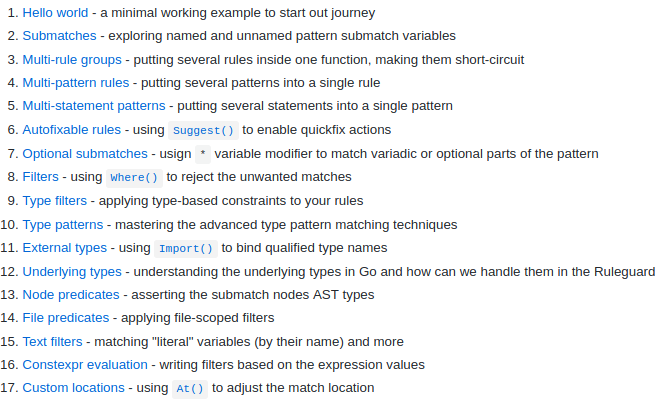この宣言的な方法でGoのリンターを作成できると言ったらどうしますか?
func alwaysTrue(m dsl.Matcher) {
m.Match(`strings.Count($_, $_) >= 0`).Report(`always evaluates to true`)
m.Match(`bytes.Count($_, $_) >= 0`).Report(`always evaluates to true`)
}
func replaceAll() {
m.Match(`strings.Replace($s, $d, $w, $n)`).
Where(m["n"].Value.Int() <= 0).
Suggest(`strings.ReplaceAll($s, $d, $w)`)
}
1年前、私はすでにルールガードユーティリティについて話しました。本日は、この時期に新たに登場したものをお伝えしたいと思います。
主な革新:
- Goバンドルを介したルールセットの設定のサポート
- プログラム可能なフィルター(バイトコードにコンパイル)
- デバッグフィルターモードを追加
- 良い教材があります:例によるルールガード
- プロジェクトには実際のユーザーと外部ルールセットがあります
- ブラウザでルールガードを直接試すことができるオンラインサンドボックス

簡単な紹介
ruleguard
動的診断を実行するためのプラットフォームです。静的分析に特化したスクリプトのインタプリタのようなもの。
DSLでルールのセットを記述し(または既製のセットを使用して)、ユーティリティを介してそれらを実行しますruleguard
。


, , . , golangci-lint. golangci-lint
.
, , . .
- , .
, .
| EN | RU | |
|---|---|---|
| Rule | AST-, ( — ). | |
| Rules group | . "", , . | |
| Rule set | . | |
| Rule bundle | () | , Go , . |
| Module | Go; — , . |
, , .
:
: , .
, , .
, Damian Gryski. — .
: , . . , .
:
-
go get
- Go :
, ruleguard , — Go ( autocomplete ).
, , :
package gorules
import (
"github.com/quasilyte/go-ruleguard/dsl"
damianrules "github.com/dgryski/semgrep-go"
)
func init() {
// , .
dsl.ImportRules("", damianrules.Bundle)
}
func emptyStringTest(m dsl.Matcher) {
m.Match(`len($s) == 0`).
Where(m["s"].Type.Is("string")).
Report(`maybe use $s == "" instead?`)
m.Match(`len($s) != 0`).
Where(m["s"].Type.Is("string")).
Report(`maybe use $s != "" instead?`)
}
, -disable
.
: DSL
dsl.Matcher
, ruleguard
.
, , . Filter()
, Go - . .
package gorules
import (
"github.com/quasilyte/go-ruleguard/dsl"
"github.com/quasilyte/go-ruleguard/dsl/types"
)
// implementsStringer .
// , T *T `fmt.Stringer`.
func implementsStringer(ctx *dsl.VarFilterContext) bool {
stringer := ctx.GetInterface(`fmt.Stringer`)
return types.Implements(ctx.Type, stringer) ||
types.Implements(types.NewPointer(ctx.Type), stringer)
}
func sprintStringer(m dsl.Matcher) {
// m["x"].Type.Implements(`fmt.Stringer`),
// : $x
// fmt.Stringer *T, T .
// : .
m.Match(`fmt.Sprint($x)`).
Where(m["x"].Filter(implementsStringer) && m["x"].Addressable).
Report(`can use $x.String() directly`)
}
:
package main
import "fmt"
func main() {
fooPtr := &Foo{}
foo := Foo{}
println(fmt.Sprint(foo))
println(fmt.Sprint(fooPtr))
println(fmt.Sprint(0)) // fmt.Stringer
println(fmt.Sprint(&foo)) // addressable
}
type Foo struct{}
func (*Foo) String() string { return "Foo" }
:
$ ruleguard -rules rules.go main.go main.go:9:10: can use foo.String() directly main.go:10:10: can use fooPtr.String() directly
-debug-filter
, :

- , , yaegi.
:
Where()
, , .
debug-group
, .
, :
func offBy1(m dsl.Matcher) {
m.Match(`$s[len($s)]`).
Where(m["s"].Type.Is(`[]$elem`) && m["s"].Pure).
Report(`index expr always panics; maybe you wanted $s[len($s)-1]?`)
}
:
func lastByte(s string) byte {
return s[len(s)]
}
func f() byte {
return randString()[len(randString())]
}
… .
$ ruleguard -rules rules.go -debug-group offBy1 test.go
test.go:6: [rules.go:6] rejected by m["s"].Type.Is(`[]$elem`)
$s string: s
test.go:10: [rules.go:6] rejected by m["s"].Pure
$s []byte: randBytes()
Where()
, . Go AST ( $s
), .
[]$elem
, — . - ( pure
).
, , string
:
- Where(m["s"].Type.Is(`[]$elem`) && m["s"].Pure).
+ Where((m["s"].Type.Is(`[]$elem`) || m["s"].Type.Is(`string`)) && m["s"].Pure).
:
test.go:6:9: offBy1: index expr always panics; maybe you wanted s[len(s)-1]?
: DSL
, , .
Go by Example. , . , .

ruleguard?
! ruleguard , Go .
, golangci-lint .
, golangci-lint
, ruleguard
{linux/amd64, linux/arm64, darwin/amd64, windows/amd64}.
. : github.com/quasilyte/go-ruleguard/rules
github.com/dgryski/semgrep-go
. .
, github.com/quasilyte/go-ruleguard/rules
, :
-
ruleguard
( ) -
go get -v github.com/quasilyte/go-ruleguard/dsl
-
go get -v github.com/quasilyte/go-ruleguard/rules
-
rules.go
, -
ruleguard
-rules rules.go
$ ruleguard -rules rules.go ./...
:
- Go
-
Bundle
, .
Go , . , Go .
package gorules
import "github.com/quasilyte/go-ruleguard/dsl"
// Bundle .
var Bundle = dsl.Bundle{}
func boolComparison(m dsl.Matcher) {
m.Match(`$x == true`,
`$x != true`,
`$x == false`,
`$x != false`).
Report(`omit bool literal in expression`)
}
testdata
, Go , .
:
// file rules_test.go
package gorules_test
import (
"testing"
"github.com/quasilyte/go-ruleguard/analyzer"
"golang.org/x/tools/go/analysis/analysistest"
)
func TestRules(t *testing.T) {
// , "rules.go"
// , : "style.go,perf.go".
if err := analyzer.Analyzer.Flags.Set("rules", "rules.go"); err != nil {
t.Fatalf("set rules flag: %v", err)
}
analysistest.Run(t, analysistest.TestData(), analyzer.Analyzer, "./...")
}
:
mybundle/ go.mod -- , "go mod init" rules.go -- ( ) rules_test.go -- testdata/ -- , target1.go target2.go ...
:
// file testdata/target1.go
package test
func f(cond bool) {
if cond == true { // want `omit bool literal in expression`
}
}
want
, . \Q
, .
go test
.

- ruleguard
- , go-critic ruleguard
- ruleguard golangci-lint
- DSL
- go-critic — , ruleguard